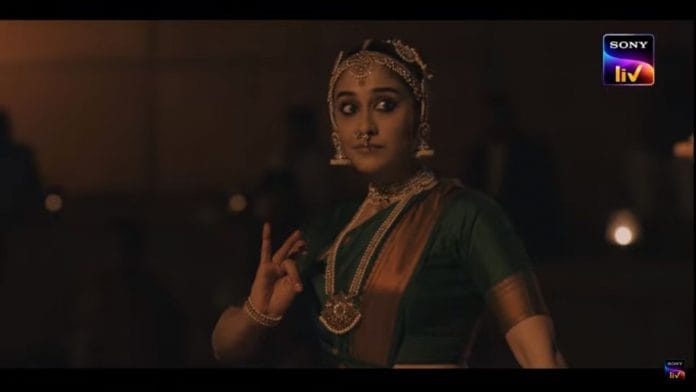Rocket Boys is a show, quite clearly, about the ‘boys’ of India’s space. But the two female characters stand out too and may just end up inspiring millennial and Gen Z women. Both Mrinalini and Pipsy have different personalities but an underlying theme binds them together.
Regina Cassandra plays Mrinalini Sarabhai, the doyenne of Indian classical dance, while Saba Azad dons the role of Pipsy, a Bombay lawyer. While they are linked to two of the most iconic names in India’s scientific community, Dr Vikram Sarabhai and Dr Homi Jehangir Bhabha, the women carve their own identities and careers.
While the character of Mrinalini is drawn from real life, Parwana is a partially fictional figure with aspects of her personality inspired from Phiroza ‘Pipsy’ Wadia, Bhabha’s close friend, confidante, and companion.
Real or fictional, these characters stand as tall as the men they love.
Also read: In Zwigato, Nandita Das wants you to look at a new class divide, India’s gig workers
Not the typical women lead
In an unconventional rejection scene of episode 3 of Season 1, Vikram runs after a public bus that Mrinalini is on, to deliver a very filmy proposal. He tells her how he left his thesis presentation midway only to stop her. Even as people in the bus urge Mrinalini to accept the ‘dreamy’ proposal, Mrinalini calmly holds her ground.
“You did not present your thesis so I should change my plans. Are you listening to yourself?”, she asks. She calls out his selfishness, and walks away without giving an answer. It is only when he changes his way — sending a blue lotus on a handmade miniature rocket to the balcony of her hostel — that she accepts the proposal.
In the first season, it appears as if Bhabha and Pipsy will end up together. But as Bhabha never takes the initiative, Pipsy decides to choose her own happiness. A lawyer by profession, Pipsy marries to someone else while also managing to maintain a healthy friendship with Bhabha.
“She is a vantage point from which you can see Bhabha as a human character as opposed to just a scientist, madman, genius,” says Saba Azad. “The banter between them was written to show that side of him.” But at no point does Pipsy trade the choice of living a full life, to wait for Bhabha, to choose her over his work, or balance his personal and professional life.
Director and screenplay writer Abhay Pannu tells a story of a certain class where women enjoyed professional and social freedoms: “During my research, I read about female lawyers and barristers who were also similar, at least in Bombay.”
Also read: In Shekhar Kapur’s ‘What’s Love Got To Do With It?’ Jemima Khan’s script the real star
Making of Mrinalini Sarabhai
Among the people on board to create the compelling series and characters are Mrinalini Sarabhai’s daughter, Mallika Sarabhai, son Kartikeya and grandson Revanta.
Mallika Sarabhai wishes more screen time was given to the love story of her parents.
“My disappointment with the first season, due to time constraint, and which is slightly corrected in the second season, is that it comes across as if Kamala and the distance comes across right in the beginning (not clear at all),” she tells thePrint.
Vikram Sarabhai’s personal life was as much a matter of public scrutiny as his philanthropy and scientific achievements. The love triangle between Mrinalini, Vikram and Kamal Chowdhury was under scrutiny. In her autobiography, Sarabhai writes of her first impression of the scientist: “It was like some powerful Rajput has landed on a tennis court right in front of me. He was so handsome and good-looking.”
Rocket Boys focuses on Vikram and Mrinalini as a married couple as much as two renowned personalities. There are also instances that the show could not incorporate, like how, for the first 12 years of her life, it was Vikram who babysat Mallika while Mrinalini was on a tour.
In the very first episode of the second season, Mrinalini firmly shuts down a journalist more curious about her absence from Vikram’s rocket launch than her dance academy.
Casting strong, independent women as characters was no deliberate attempt by Pannu as the director himself admits: “Growing up, I have seen such strong, independent women in my life. Be it my mother or teachers. I didn’t do it to tick off the right boxes, there is just no other way of doing it, for me.”
Also read: DC’s Shazam! 2 is your standard comic book story. But it wins where Marvel fails
Privilege and education
“Women of a certain class and upbringing at the time were very liberal,” Cassandra tells ThePrint. These are men and women who have studied abroad and have an understanding of what it will take to make India an independent nation,” she adds.
Mrinalini begins her dance journey in Switzerland where she spent her childhood, while Pipsy too is foreign educated, wears western dresses, and pants, and is an equal contributor to conversations while attending gatherings with Bhabha.
In an interview with Geeta Chandran, Mrinalini Sarabhai acknowledges her privilege and talks about how her family was “progressive in many ways”. But she became the person the world would later see, only after she joined Rabindranath Tagore’s Santiniketan. At Santiniketan, she got the environment to develop her talents and personality too. That is probably why, quite gracefully, she expresses her pain and anguish over her husband’s affair through a dance performance, titled ‘Blue Lotus’. Or when she refuses to blame Kamala for her husband’s infidelity.
The screenplay and dialogues by Kausar Munir and Pannu too contribute in making the women characters look impactful.
“If I had to take away one trait each from Mrinalini and Pipsy, it would be the grace of the former and wit of Pipsy,” says Pannu.
(Edited by Anurag Chaubey)






